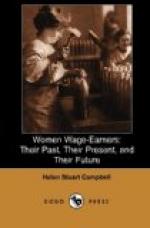The average weekly earnings for the average time employed, 42.95 weeks, was $6.01, and the average weekly earnings of all the working-girls of Boston for a whole year were $4.91. The average weekly income, including earnings, assistance, and income from extra work done by many, was $5.17 a year.
The average yearly income from all sources was $269.70, and the average yearly expenses for positive needs $261.30, leaving but $7.77, on the average, as a margin for books, amusements, etc. Those making savings are 11 per cent of the whole, their average savings being $72.15 per year. A few run in debt, the average debt being $36.60 for the less than 3 per cent incurring debt.
Of the total average yearly expenses, these percentages being based upon the law laid down by Dr. Engels of Prussia, as to percentage of expenses belonging to subsistence, 63 per cent must be expended for food and lodging, and 25 per cent for clothing,—a total of 88 per cent of total expenses for subsistence and clothing, leaving but 12 per cent of total expense to be distributed to the other needs of living.
These are, briefly summed up, the results of the investigation, in which the single workers constituted 88.9 of the whole, and the married but 6 per cent, widows making up the number. It is impossible in these limits to give further detail on these points, all readers being referred to the report itself.
The same questions that had first sought answer in New England were even more pressing in New York. As in most subjects of deep popular or scientific importance, the sense of need for more data by which to judge seemed in the air; and already the Labor Bureau of the State of New York, under the efficient guidance of Mr. Charles F. Peck, had begun a course of inquiries of the same nature. For years, beginning with the New York “Tribune,” in the days when Margaret Fuller worked for it and touched at times upon social questions,—always in the mind of Horace Greeley, its founder,—there had been periodical stirs of feeling in behalf of sewing-women. It was known that the enormous influx of foreign labor naturally massed at this point, more than could ever be possible elsewhere, had brought with it evils suspected, but still not yet defined in any sense to be trusted. Indications on the surface were seriously bad, but actual investigation had never tested their nature or degree. The report of the bureau for 1885, which was given to the public in 1886, met with a degree of interest and study not usually accorded these volumes, and roused public feeling to an unexpected extent.
Mr. Peck brought to the work much the same order of interest that had marked that of Colonel Wright, and wrote in his introduction to the report the summary of the situation for New York City:—




